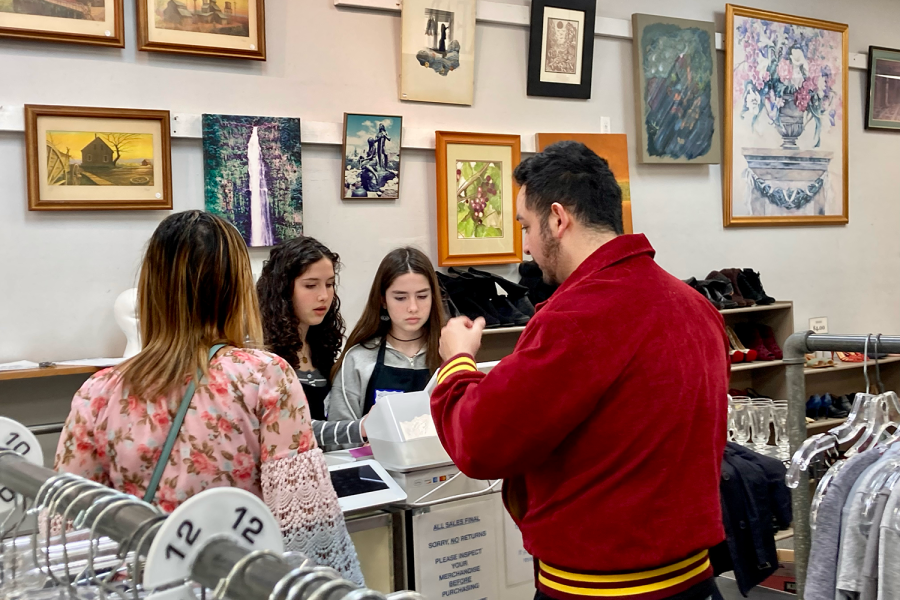Op-Ed: Too many words
Photo credit: Nicole Williams
My younger sister and I work at the register at Timeless Treasures Ticktocker Thrift Shop in Culver City. We were nervous for our first time managing the register, as our people skills had gotten worse due to quarantine. However, spending hours talking to customers helped us improve communication with them through words and friendly gestures.
April 17, 2023
The story of human communication has shifted drastically in recent years. When we were isolated during the COVID-19 pandemic, we had hours to text friends, write long emails to teachers and rethink witty Instagram captions. The months of lockdown people spent online created a new digital etiquette for talking through screens: exclamation marks became mandatory to avoid sounding angry, gamers got married in Animal Crossing and our word repertoire changed from an entire dictionary to “idk,” “for real” and “kay.”
Albert Mehrabian, a body language researcher, found 55% of human communication is nonverbal, while 38% is vocal and only 7% is words. This means quarantine stripped away over 90% of our communication skills. We were forced to replace every eyebrow raise, angry tone and strong hand gesture with more words, whether over text or on Twitter. This new digital body language used an excessive amount of words to compensate for the loss of in-person, nonverbal cues.
Coming back from the pandemic, we should have jumped right back into eye contact and body language, but we couldn’t. In my English class, it took some students five minutes of backstory, “um” and “I don’t really know” to communicate a single idea. Job interviewees rambled on about unimportant personal details, trying hard to avoid the interviewer’s eyes.
Returning to face-to-face interactions forced a shift from our online wordiness back to body language, but our in-person communication has worsened. In formal situations, it’s harder for us to explain simple concepts: people talk more to say less.
Quarantine is over, but the popularity of 140-character posts, hundreds of text messages a day and instant calls reinforces this wordiness. When influencers popularize phrases, society obsessively adopts them. Similar to texting, we copy and paste words to express many different messages in real life — I’ve used “love you” with my sister but also to express my feelings for Trader Joe’s.
Using these words as feelings towards family and groceries have confused their value.
Society has fallen into circumlocution; we use too many words in-person because we solely used words on devices. Since texting doesn’t have natural conversation pauses, we try to constantly fill “unbearable” silences with meaningless words, effectively talking without saying anything. By not readopting nonverbal cues, we’re destroying our language.
It’s a vicious cycle. Overusing words has devalued them, so we overuse even more words to express a simple idea.
Remember we have an entire dictionary full of words to express your thoughts. Expanding your vocabulary by reading, watching films or even playing the New York Times’ word games will give you a wider range of words to choose from — rich words that haven’t been overused. I’ve recently adopted epiphany, euphoria and flabbergasted. Yes, flabbergasted.
We have a communication toolkit; it’s full of posture, touch, facial expressions and voice inflections — not just words. Resist the urge to use filler words, and instead pause to think before you speak. A single step, touch or smile, or a detailed vocabulary word, can help you answer “How are you?” just as well as your hundred-word rant.
With deep vocabulary and nonverbal mannerisms, people could reclaim language and say what they truly mean, so we could communicate effectively again.










